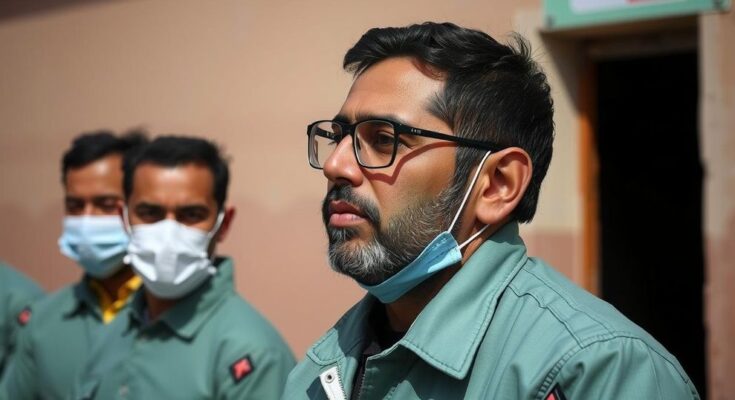Four Moroccan activists, including Said Ait Mahdi, face charges of defamation and insulting public officials after advocating for earthquake victims in court. The legal actions follow complaints from local authorities regarding social media posts. The 6.8-magnitude earthquake in September 2023 devastated the Al Haouz province, leading to significant loss of life and destruction of homes. Reconstruction efforts are underway, but activists demand faster action and more support for affected families.
In Rabat, four activists advocating for victims of the devastating September 2023 earthquake in Morocco appeared in court on Monday facing charges, including defamation. Among them is Said Ait Mahdi, the leader of the Al Haouz Earthquake Victims Coordination, who is currently in custody. His lawyer, Mohamed Nouini, indicated that the charges stem from local officials’ complaints regarding social media posts that they considered offensive. While Ait Mahdi has been held for a week, the other three activists remain free but face accusations of insulting public officials. Ait Mahdi’s legal team has submitted a request for his release pending a trial set for January 6.
The earthquake, which registered a magnitude of 6.8, primarily impacted the Al Haouz province, resulting in approximately 3,000 fatalities and numerous injuries. It also destroyed tens of thousands of homes, forcing many families to endure harsh winter conditions outdoors. In the aftermath, Ait Mahdi’s group has been vocal about the urgent need for accelerated reconstruction efforts and increased support for affected families. Reports indicate that by early December, Moroccan authorities had issued around 57,000 reconstruction permits, with over 35,000 homes under construction or completed.
The government has rolled out a comprehensive five-year reconstruction initiative, estimated to cost $11.7 billion. Notably, a substantial portion of the budget, about $740 million, is designated to assist displaced families in rebuilding their homes, with the financial support being allocated in installments. The activists’ legal situation highlights the broader issues of accountability and response to the disaster in Morocco, underlining the importance of constructive dialogue concerning rebuilding efforts and the rights of those advocating for victims.
Following the catastrophic earthquake that struck Morocco in September 2023, the Al Haouz province experienced unparalleled devastation, with thousands left homeless. In this context, activists like Said Ait Mahdi have sought to represent the voices of victims and call for expedited reconstruction and support. However, tensions have arisen with local officials, who have responded to online criticisms with legal actions against the activists. This situation has raised questions about freedom of expression and the government’s accountability to its citizens in the face of natural disasters.
The court proceedings against the activists, particularly Said Ait Mahdi, highlight critical tensions between governmental authorities and civil society in Morocco following a catastrophic earthquake. As efforts to rebuild the affected areas progress, the legal challenges faced by those advocating for victims’ rights may signify broader implications for public discourse and accountability in disaster response. The forthcoming trial will be pivotal in determining both the activists’ fates and the government’s willingness to engage with dissenting voices in the reconstruction dialogue.
Original Source: www.arabnews.com




